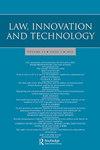Error 404: looking for trust in international law on digital technologies
Q1 Social Sciences
引用次数: 0
Abstract
ABSTRACT Despite their importance in the ethics of digital technologies, trust and trustworthiness do not appear in the international law on digital technologies. This surprising absence is the point of departure of this paper. On the basis of a survey of philosophical and empirical scholarship on trust in the context of digital technologies (especially AI), the article proceeds by identifying relevant norms in international law which can be considered to operationalise relevant dimensions of trust and trustworthiness. By clustering these norms, a technical conception of trust appears, focused on securing the trustworthiness of an AI system. This conception is based on the framing of an AI system as an agent and on the premise that the role of the law is to promote the uptake of technologies. This technical conception of trust should be enriched by way of three relevant extensions, each addressing in turn: the responsibility of developers, the power relations between users and developers of AI systems, and the benefits associated with the use of AI systems. This extended conception of trust also extends the realm of relevant legal norms that can be used to address AI-powered actions.错误404:寻求对数字技术国际法的信任
尽管信任和可信赖性在数字技术伦理中具有重要意义,但它们并未出现在数字技术国际法中。这种令人惊讶的缺失是本文的出发点。在对数字技术(尤其是人工智能)背景下信任的哲学和实证研究进行调查的基础上,本文首先确定了国际法中的相关规范,这些规范可以被认为是对信任和可信赖性的相关维度进行操作。通过聚集这些规范,出现了信任的技术概念,重点是确保人工智能系统的可信赖性。这一概念是基于将人工智能系统作为代理的框架,并以法律的作用是促进技术的吸收为前提。这种信任的技术概念应该通过三个相关的扩展来丰富,每个扩展依次解决:开发人员的责任,人工智能系统的用户和开发人员之间的权力关系,以及与使用人工智能系统相关的利益。这种扩展的信任概念也扩展了相关法律规范的领域,可用于解决人工智能驱动的行动。
本文章由计算机程序翻译,如有差异,请以英文原文为准。
求助全文
约1分钟内获得全文
求助全文
来源期刊

Law, Innovation and Technology
Social Sciences-Law
CiteScore
4.50
自引率
0.00%
发文量
18
期刊介绍:
Stem cell research, cloning, GMOs ... How do regulations affect such emerging technologies? What impact do new technologies have on law? And can we rely on technology itself as a regulatory tool? The meeting of law and technology is rapidly becoming an increasingly significant (and controversial) topic. Law, Innovation and Technology is, however, the only journal to engage fully with it, setting an innovative and distinctive agenda for lawyers, ethicists and policy makers. Spanning ICTs, biotechnologies, nanotechnologies, neurotechnologies, robotics and AI, it offers a unique forum for the highest level of reflection on this essential area.
 求助内容:
求助内容: 应助结果提醒方式:
应助结果提醒方式:


